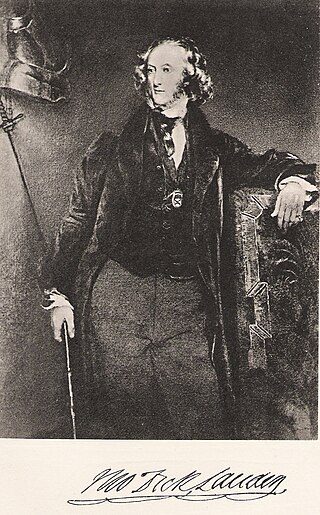The Maitland Club was a Scottish historical and literary club and text publication society, modelled on the Roxburghe Club and the Bannatyne Club. It took its name from Sir Richard Maitland (later Lord Lethington), the Scottish poet. The club was founded in Glasgow in 1828, to edit and publish early Scottish texts. [1] Since the distribution of the publications was usually limited to members, the typical print run was between seventy and a hundred copies. The club was wound up in 1859, after publishing its own history as its 80th volume. [2] The later Hunterian Club modelled themselves on the Maitland Club. [3]

The Dean Cemetery is a historically important Victorian cemetery north of the Dean Village, west of Edinburgh city centre, in Scotland. It lies between Queensferry Road and the Water of Leith, bounded on its east side by Dean Path and on its west by the Dean Gallery. A 20th-century extension lies detached from the main cemetery to the north of Ravelston Terrace. The main cemetery is accessible through the main gate on its east side, through a "grace and favour" access door from the grounds of Dean Gallery and from Ravelston Terrace. The modern extension is only accessible at the junction of Dean Path and Queensferry Road.

Sir John Robert Steell was a Scottish sculptor. He modelled many of the leading figures of Scottish history and culture, and is best known for a number of sculptures displayed in Edinburgh, including the statue of Sir Walter Scott at the base of the Scott Monument.

Malcolm Laing was a Scottish historian, advocate and politician.

Sir Thomas Dick Lauder of Fountainhall, 7th Baronet, FRSE FSA(Scot) LLD was a Scottish author. He served as Secretary to the Board of Manufactures (1839–), on the Herring Fisheries Board, at the Royal Institution for the Encouragement of the Fine Arts, and as Deputy Lieutenant of both counties of Moray and Haddington.
Sir Richard Maitland of Lethington and Thirlstane was a Senator of the College of Justice, an Ordinary Lord of Session from 1561 until 1584, and notable Scottish poet. He was served heir to his father, Sir William Maitland of Lethington, East Lothian, and Thirlestane, Berwickshire, on 15 October 1515, his father being one of the casualties at the Battle of Flodden. He held the political office of Keeper of the Great Seal of Scotland and was also the Keeper of the Privy Seal of Scotland, from 1563 to 1567, and was succeeded in this post by his son Sir John Maitland, 1st Lord Maitland of Thirlestane.
James Moncreiff, 1st Baron Moncreiff of Tullibole LLD was a Scottish lawyer and politician.
The Bannatyne Club, named in honour of George Bannatyne and his famous anthology of Scots literature the Bannatyne Manuscript, was a text publication society founded by Sir Walter Scott to print rare works of Scottish interest, whether in history, poetry, or general literature. The club was established in 1823 and printed 116 volumes before being dissolved in 1861.
James Maidment was a British antiquary and collector. He passed through Edinburgh University to the Scottish bar, and was chief authority on genealogical cases.

Clan Douglas is an ancient clan or noble house from the Scottish Lowlands.
The Scalacronica (1066–1363) is a chronicle written in Anglo-Norman French by Sir Thomas Grey of Heaton near Norham in Northumberland. It was started whilst he was imprisoned by the Scots in Edinburgh Castle, after being captured in an ambush in October 1355, and completed in England after his release. The chronicle documents the history of Britain until 1363, and is one of the few early chronicles written by a layman.

Clan Maitland is a Lowland Scottish clan.
The Abbotsford Club was a text publication society founded in Edinburgh in 1833 or 1834. This was the year after the death of Sir Walter Scott, whose residence of Abbotsford House gave the society its name, and whose literature the club's publications sought to illuminate. The club was modelled on the Roxburghe Club, of which Scott himself had been a member, as well as the Bannatyne Club, which was founded by Scott, and the Glasgow-centred Maitland Club. The founder and first secretary of the club was William Barclay Turnbull, a young Edinburgh lawyer. The stated objective of the Abbotsford Club was "the printing of Miscellaneous Pieces, illustrative of History, Literature, and Antiquities". Through its publishing activity, the club did much to promote the proliferation of Middle English literature. The Abbotsford Club effectively ceased publication in 1866.

John Dunlop of Rosebank was a Scottish songwriter who served as Lord Provost of Glasgow from 1794 to 1796.
Events from the year 1832 in Scotland.
Events from the year 1828 in Scotland.
Events from the year 1826 in Scotland.
Events from the year 1823 in Scotland.
Events from the year 1804 in Scotland.
The Hunterian Club was a Scottish literary and text publication society, founded in Glasgow in 1871.